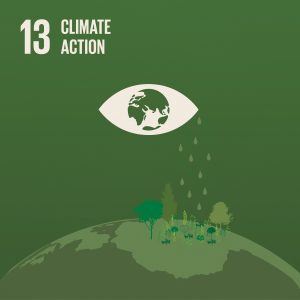As I write this, the 26th United Nations Climate Change Conference of the Parties – COP 26 for short – is about to convene in Glasgow Scotland. It opens on October 31 and ends on November 12. Before 1995 when COP 1 was convened we already knew that planetary warming and resulting climate change was a threat that we must address. Yet, the developed nations of the world, those responsible for this problem, frittered away thirty years during which more moderately paced actions could have been taken.
As a result, a forty-year window has shrunk to ten if we are to make the kinds of changes needed to avoid levels of warming that we do not want to see. The latest report from the Intergovernmental Panel on Climate Change makes that starkly clear, as reported in a recent New York Times article. With a sense of urgency and focused action, we have every reason to believe our efforts will not only prevent the worst, but they will also yield exceptionally positive results, regenerating a better social, economic, and environmental future for all.
To get there, we must address two things. One is the ongoing and intentional barrage of disinformation specifically created to confuse people and block action, supported by the money thrown at elected public servants to help with this. This includes companies who profess public support for climate action but support groups lobbying hard against any meaningful federal action. The other is taking the steps we need to take, steps that we already know how to take and are taking on a small scale, steps that are sufficient to draw down greenhouse gas (GHG) concentrations in the atmosphere. One is a war; the other is not.
Fossil fuel companies are fighting a war against meaningful action, and we must fight back.
On the other hand, steps needed to address the problem of planetary warming and climate change are not combat at all, but positive, forward-thinking actions full of promise and opportunity for economic, social, and environmental flourishing.
Michael Mann is a Distinguished Professor of Atmospheric Science and Director of the Earth System Science Center at Penn State. His most recent book is The New Climate War: The Fight to Take Back Our Planet. In the book, he explains that the messaging used by longstanding climate science deniers, who for decades have claimed that climate change isn’t real, that higher carbon dioxide concentrations are good for us, that climate science is hysteria, etc., no longer work. That’s because the science is so strong, and the evidence piling up every day is so obvious; those arguments have collapsed.
Those he calls “inactivists” now pitch denial in forms he labels “downplaying, deflecting, dividing, delaying, and despair-mongering.” These approaches, described in the book, are intended to focus blame on individual actions rather than on fossil fuel companies where they belong, foster division and infighting among climate activists over issues like flying or driving gasoline fuel cars, and disempower a people’s movement by convincing us that its already game over and therefore worthless to do anything about it.
By identifying and understanding these tactics, we can recognize and defeat them. Mann proposes a four-point “battle plan” to blunt these efforts:
- “Disregard the Doomsayers” who intentionally distort the science with “unsupported claims of runaway warming….” We must call them out whenever we see messaging like this, which some activists have unfortunately picked up and spread. Doom is regretfully a thing among some climate activists. The key message we must convey, according to Mann, is urgency and agency. This is a real problem, but we have the ability and power to fix it!
- “A Child Shall Lead Them” means being inspired by and following the lead of a generation of young people who are demanding action. “We should model our actions after theirs and learn from their methods and their idealism.” It is often younger generations that catalyze change.
- “Educate, Educate Educate,” meaning that we should not bother with the hardcore deniers and inactivists and focus on helping the “many honest, confused folks out there who are caught in the crossfire, victims of the climate-change disinformation campaign.” There are fewer people in this category than ever before, and for positive reasons. According to the Yale Program on Climate Change Communication in a new report: “Large majorities of registered voters, including many Republicans, support a variety of climate and energy policies, including many currently being considered by Congress:
- 86% support providing tax incentives or rebates to homeowners, landlords, and businesses to make existing buildings more energy-efficient.
- 81% support funding more research into renewable energy sources.
- 81% support providing tax rebates to people who purchase energy-efficient vehicles or solar panels.
- 79% support providing tax incentives or rebates to homeowners, landlords, and businesses to purchase appliances that can be powered without burning fossil fuels.
- 75% support setting aside 30% of America’s lands and waters for conservation by 2030.
- 75% support regulating carbon dioxide as a pollutant.
- 74% support requiring publicly traded corporations to disclose how much carbon pollution they produce.
- 70% support transitioning the U.S. economy (including electric utilities, transportation, buildings, and industry) from fossil fuels to 100% clean energy by 2050.
- 70% support increasing federal funding to low-income communities and communities of color who are disproportionally harmed by air and water pollution.
- 69% support requiring fossil fuel companies to pay a tax on the carbon pollution they produce and using that revenue to reduce other taxes (such as the federal income tax) by an equal amount [i.e., a revenue-neutral carbon tax].
- 66% support requiring electric utilities to produce 100% of their electricity from renewable energy sources by the year 2035.”
Wow!
So why is it that public policy does not reflect the will of the American people? Because powerful monied interests spend a lot to make sure it is their interests that get served. This has dismally been the case on a variety of issues for at least the past 30 years. In 2014, Martin Gilens at Princeton and Benjamin Page at Northwestern published research that proves this point. Read this article that summarizes the research and includes a link to the study. They conclude: “When the preferences of economic elites and the stands of organized interest groups are controlled for, the preferences of the average American appear to have only a minuscule, near-zero, statistically non-significant impact upon public policy.”
Which brings us to the fourth strategy in Mann’s battle plan:
- “Changing the System Requires Systemic Change.” In my view, this is our highest-leverage strategy and the most important to accomplish. Mann explains: “We need policies that will incentivize the needed shift away from fossil fuel burning toward a clean, green global economy. So-called leaders who resist the call for action must be removed from office.” And be replaced by those who will represent the public interest and the common good now with an eye toward the future.
When it comes to taking the specific, bold, full-of-promise steps needed to reduce and eliminate GHG emissions and eventually draw down GHG concentrations in the atmosphere, this column has explored these topics in earlier posts.
Project Drawdown has transformed the way I think about and present on climate change. From this Director’s Corner on Project Drawdown from 2017: “Drawdown urges us to think and talk differently about global warming. We should think and talk less about fighting a war on global warming and think and talk more about the opportunities this crisis creates as consequences of past and current behaviors become more apparent. It gives us reasons to “restore, redress, reform, rebuild, recover, reimagine, and reconsider” the way we do things. That’s why (Paul) Hawken says that “Climate change is an offering, an opportunity.”
From the creative mind of architect Bill McDonough: We need to rethink the way we think and talk about carbon. Here’s my Director’s Corner on the way we should think about carbon from March 2021. McDonough: “But all of a sudden one day it occurred to me that carbon had become the enemy. And for a person who works with materials, this is really sad. Demonizing carbon? We are carbon…. The idea of looking at carbon and saying it is bad — carbon is an innocent element, a magnificent thing because it is a core of life. I thought, what if we redefine our way of dealing with it and what if we had new language for carbon that does not demonize it?”
Project Drawdown and McDonough’s insights about carbon shine a light on what is possible if we are willing to think and act from a different perspective.
By confronting lies and obstructions, holding elected officials accountable to the public interest and will of the people, and acknowledging the solutions at hand, we will be energized to move with momentum and urgency to snatch climate victory from the jaws of obstructionist defeat.
Learn about the SDGs & AU and our contributions related to this post.






